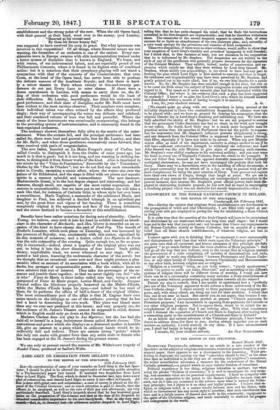LORD GREY ON EMIGRATION FROM IRELAND TO CANADA.
TO ' THE EDITOR OF THE SPECTATOR.
17th February 1847.
Sin—In corroboration of some of your remarks on Lord Grey in the last Spec- tator, I should be glad to be allowed the opportunity of drawing public attention to a Parliamentary paper just issued. It contains two despatches from Lord Grey to Lord Elgin. The first, which is dated in December last, lays down a new plan of colonization, and directs. Lord Elgin to carry it into effect IS Canada. All this is done with great care and minutenessr a sum of money is placed at the dis- posal of the Colonial Governor; and so much attention is paid to details, that the officers to be employed, as well as the rate of their pay and allowances, are very particularly described. Lord Grey's despatch shows that he has bestowed great pains on the preparation of the scheme, and that at the date of his despatch he attached considerable importance to his own bandywork. But in the very next month—that is, in January last—he addresses another despatch to Lord Elgin,
telling him that be has quite-ehanged his mind; that -he -finds the instructions contained in his first despatch are impracticable; and that be therefore withdraws them. The remainder of the second despatch appears to consist, first, of some excuses for so facile an abandonment of his own elaborate plan; and secondly, of a very weak apology for the privations and miseries of Irish emigration.
These two despatches, if there were no other evidence, would suffice to show that your suspicion of Lord Grey's timidity and practical incapacity is well founded; but I think that, in this instance at least, you are mistaken in the supposition that he is influenced by Mr. Stephen. The despatches are not written in the style of any of the gentlemen who generally prepare documents for the signature of the Colonial )(mister. They exhibit, indeed, modes of construction and ex- pression which satisfy me that they were written by Lord Grey himself. Mr. Stephen, whose ability you acknowledge, is too clever to have had any part in forming the plan which Lord Elgin is first desired to execute and then to forget. Its crudeness and impracticability may have been perceived by Mr. Stephen, and gently pointed out to his noble chief; but if so, we owe him thanks for a public service. No, Sir; Mr. Stephen-has done mischief enough in his time, but rely on it he cares too little about the subject of Irish emigration to take any trouble with regard to it Yon speak as if some valuable plan had been frustrated within the Colonial Office; but where is the evidence that such .a plan has been suggested by anybody? I know of no plan but Lord Grey's own; which he himself scouted and demolished within a month of having brought it to maturity.
[We should quite go along with our correspondent in being amused at the triviality displayed in these two contradictory despatches, if colonies were toys to be played with; and we have no ground for denying his assumption that the original blunder lay in Lord Grey's headlong and unthinking zeal. We have also fully admitted the ability of Mr. Stephen: but we are not prepared to assume that the permanent Under-Secretary has had no share in the work now brought to our notice. No doubt, Lord Grey may be a mach more incapable man for practical action than his spwhes in Parliament have led the public to suppose; but the impression that Stephen's influence prevails ubiquitously is strong, and any despatch from the Colonial Office is -supposed to have passed through that Sher, especially if it have any taint in its savour. When any new Minister enters office es head of the department, curiosity is always excited to see if he will have sufficient substantive strength to withstand the influence; and Lord John Russell was the only Minister to give signs of possessing such.starains. Mr. Stephen's very ability conduces to his universal activity; and you may trace his hand in every one of England's Colonies, from the oldest to the youngest. It does not follow that because he has opposed desirable measures with hopelessly multiplied obstructions, he may not have encouraged idle projects that took his fancy. There may be a favouritism even in the handling of official documents: a pet paper community may be struck off in a day, or may be pushed with all the more complacency for being the pure creation of fancy. Your gravest red-tapista have their own views of Utopia, though they laugh at yours. We are not in possession of any reasons for corroborating our ppoondent's assumption in the present instance, that because Mr. Stephen's great otbcial powers have been dis- played in obstructing desirable projects, he has now had no hand in encouraging a headlong project which was not desirable but merely impracticable.---En.]


























 Previous page
Previous page